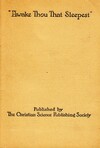

Are you sure?
This bookmark will be removed from all folders and any saved notes will be permanently removed.
Procrastination
Originally published in July 29, 1916 issue of The Christian Science Monitor
The human mind riots in procrastination. It is true that it has made such an idol of the habit that its perpetual obeisances pass almost unknown to itself. At the same time, if the man in the street would be entirely frank with himself, a luxury which is one of the few he is always ready to practice self-denial over, he would discover that the proverb, "Procrastination is the thief of time," is true not only as an abstract relative fact, but as a common truism in the practice of his own and his neighbors' lives.
When Jesus said, to the disciples, "Sufficient unto the day is the evil thereof," he by no means meant, as some people would like to believe, never do today what you can put off until tomorrow. Nevertheless, after eighteen centuries of scholastic and popular theology, Christendom is composed, as Carlyle might have said, of so many millions mostly tomorrowists. In exactly the same way, Mrs. Eddy wrote, onpage 485of Science and Health, "Emerge gently from matter into Spirit." Numbers of readers regard this, without a qualm, as advice to take your time in the process of obeying Paul's advice to “let this mind be in you, which was also in Christ Jesus." To them gently becomes quite naturally a synonym for slowly. The diver, however, who comes to the surface gently, and without a ripple, invariably does so much more quickly than the one who emerges splashing and beating the surface.
The truth is, of course, that the struggle to know more of Principle cannot be carried on too persistently. The human mind loves relaxation. It makes a law for itself that a certain amount of relaxation is not only desirable but good, not only good but necessary. It, indeed, gets almost angry if its neighbor points out that metaphysically this is a fallacy, and that humanly it is a matter of opinion—of individual demonstration. There is such a thing as making your own limitations a bludgeon for your neighbor. That one man's meat is another man's poison is obvious in the realm of human action. It is only in the realm of the spiritual, or absolute, that law operates scientifically, that is, without variation. And so-called law which varies is not law, but an average of chances.
Enjoy 1 free Sentinel article or audio program each month, including content from 1898 to today.
JSH Collections
This article is included in:
1917 - PAMPHLET
Awake thou that sleepest
JSH-Online has hundreds of pamphlets, anthologies, and special editions for you to discover.


